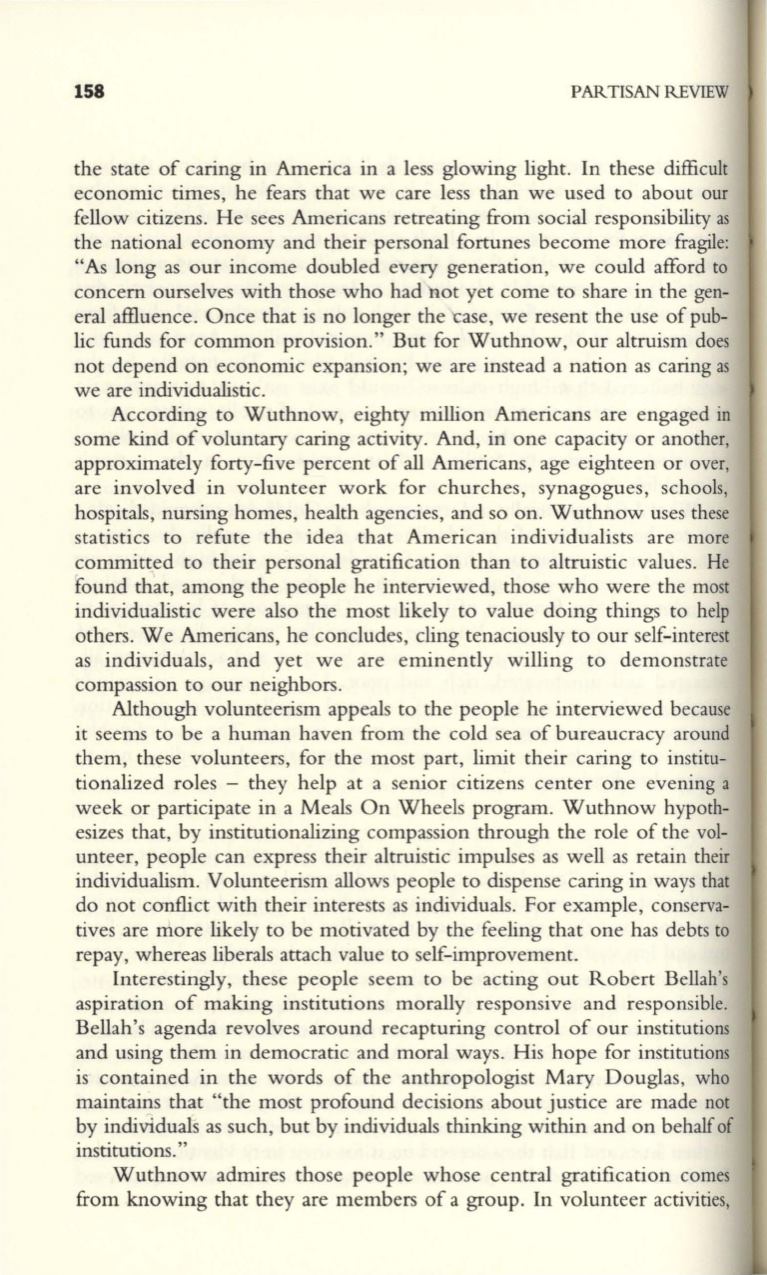
158
PARTISAN REVIEW
the state of caring in America in a less glowing light. In these difficult
economic times, he fears that we care less than we used to about our
fellow citizens. He sees Americans retreating from social responsibility as
the national economy and their personal fortunes become more fragile:
"As long as our income doubled every generation, we could afford to
concern ourselves with those who had hot yet come to share in the gen–
eral affiuence. Once that is no longer the 'case, we resent the use of pub–
lic funds for common provision." But for Wuthnow, our altruism does
not depend on economic expansion; we are instead a nation as caring as
we are individualistic.
According to Wuthnow, eighty million Americans are engaged in
some kind of voluntary caring activity. And, in one capacity or another,
approximately forty-five percent of all Americans, age eighteen or over,
are involved in volunteer work for churches, synagogues, schools,
hospitals, nursing homes, health agencies, and so on. Wuthnow uses these
statistics to refute the idea that American individualists are more
committed to their personal gratification than to altruistic values. He
found that, among the people he interviewed, those who were the most
individualistic were also the most likely to value doing things to help
others. We Americans, he concludes, cling tenaciously to our self-interest
as individuals, and yet we are eminently willing to demonstrate
compassion to our neighbors.
Although volunteerism appeals to the people he interviewed because
it seems to be a human haven from the cold sea of bureaucracy around
them, these volunteers, for the most part, limit their caring to institu–
tionalized roles - they help at a senior citizens center one evening a
week or participate in a Meals On Wheels program. Wuthnow hypoth–
esizes that, by institutionalizing compassion through the role of the vol–
unteer, people can express their altruistic impulses as well as retain their
individualism. Volunteerism allows people to dispense caring in ways that
do not conflict with their interests as individuals. For example, conserva–
tives are more likely to be motivated by the feeling that one has debts to
repay, whereas liberals attach value to self-improvement.
Interestingly, these people seem to be acting out Robert Bellah's
aspiration of making institutions morally responsive and responsible.
Bellah's agenda revolves around recapturing control of our institutions
and using them in democratic and moral ways. His hope for institutions
is contained in the words of the anthropologist Mary Douglas, who
maintains that "the most profound decisions about justice are made not
by individuals as such, but by individuals thinking within and on behalf of
institutions. "
Wuthnow admires those people whose central gratification comes
from knowing that they are members of a group. In volunteer activities,


